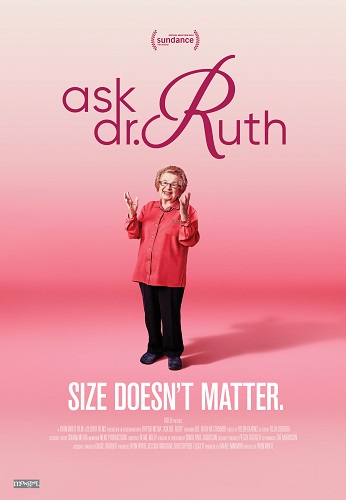
Screening of ‘Ask Dr. Ruth’ brings conversation of sexual health to campus
The Office of Student Diversity, Equity and Inclusion (SDEI) and the Campus Activities Board (CAB) collaborated to present “Ask Dr. Ruth” at Hunter Hall on Sept. 26 to educate and discuss sexual health and sexual health resources students can contact.

“Ask Dr. Ruth” is a documentary about Ruth Westheimer, or more commonly known as Dr. Ruth – a Holocaust survivor, grandmother and sexual health therapist – who began her career on WYNY-FM’s radio station in New York City during the 1980s with her late-night talk show “Sexually Speaking.” She continues her career to this day writing books, teaching and giving lectures.
“Hunter Hall was chosen as opposed to another location because of two reasons,” said Natalia Marfil, co-president of CAB. “The logistical reason is that the other locations were unavailable for that day and time. The educational reason is that we believe it is important to discuss sexual health (as well as sexual health resources available to students) with students who will be living together.”
Students attending the event had their own reasons to watch the documentary.
“I like to support people who are helping to know more about sexual education or inform themselves about sexual education,” said Daris Randele, business major. “It’s also interesting to get the perspective of another generation. So, it will be an interesting conversation. Kind of address the age gap.”
“I think the topic is important,” said Jasara Scates, social work major. “I like the work that SDEI does and I like to support it at every opportunity.”
Before watching the film, Aja Rodriguez, coordinator of SDEI, gave all attendees two squares of paper with which to write down any questions they might have during the movie; after which she collected and answered the questions during the group discussion.
“I hope that they take away that it’s ok to talk about sex and healthy to talk about sex, and that it doesn’t matter how old you are ‘cause I think a lot of people think that older generations are kind of more prudish or more traditional in a lot of senses, but [Dr. Ruth] kind of breaks that norm and is able to talk about sex, and I think that that’s important,” Marfil said.
After watching the film, Rodriguez headed the discussion by answering the questions attendees had written down on their sheets of paper. Questions ranged from where unisex restrooms were located on campus and dispelling myths about HIV to why sex education was important and is lacking in high schools where the topic is not talked about in-depth and contraceptive devices are not fully discussed as a viable alternative to abstinence.
“We cannot have conversations like that where we are not knowledgeable about private parts, right, and about how they work, where they’re part, what color they are, what they look like, how they function,” Rodriguez said. “I think that would be my take away: take away the fear, the shame and the guilt. Start learning more about it and start being more comfortable talking about not so – not so that you can like have your aunties being like ‘Oh, lord come here child let’s put soap up your mouth!’ and not so you can be the shocking one at the party, but so you can know how things work, so you can be knowledgeable for your health.”
Rodriguez likened learning about sexual education to learning about a car. If one does not know how a car works, how to drive it, how to care for it, it will put the driver at greater risk of an accident or maintaining a sickly car. Similarly, if one does not learn about how their bodies function or react to stimuli, or feel confident in their bodies, there is a higher chance for themselves or others to neglect their bodies or seek information themselves from inexperienced sources such as peers or Internet sites.
“Being open to still have that kind of conversation [about sexual health] with other people is important as well as with family members and significant others and, I think, especially with significant others,” Marfil said. “If you are partaking in sexual activity it is important to kind of have those conversations, and if those conversations haven’t started then kind of taking that initiative as well.”
As Dr. Ruth discussed in the film and Rodriguez elaborated on in her conversation with attendees, when speaking about sexual health or relationships communication, consent and care are the cornerstones for sharing safe intimate moments with others – even if the relationship is not sexual in nature.
As Dr. Ruth said in the film, “Respect is not debatable.”
